CactusVPN Review
CactusVPN is an affordable VPN with strong encryption and protocols, but the service showed some serious flaws the more we dug into this CactusVPN review. Read on for the full prickly details.
CactusVPN is a great example of a company that shows promise but still misses the mark. There are many things that Moldova-based CactusVPN gets right. It has affordable and competitive pricing, including a free trial, as well as a ton of choices for protocols and solid encryption.
While the foundation for something great is definitely there, the deeper we got into this CactusVPN review, the more the flaws we found. The software actually ended up causing issues on our computer and there were DNS leaks despite the strong protocol and encryption. Plus, some of its marquee features, like “smart DNS,” were hit or miss in their functionality.
While all these issues keep CactusVPN from even coming close to our list of the best VPN service providers, we have to give it some credit for doing things differently. While it isn’t the standard approach, the idea of a “smart DNS” as a stand-alone service is something that could take off one day; but for now, VPNs are still the king of unblocking content.
Strengths & Weaknesses
Pros:
- Free three-day trial
- Competitive pricing
- Good protocol & encryption
Cons:
- Connection issues throughout testing
- DNS leaks on default settings
- Can’t access streaming content
Features
CactusVPN is a mixed bag when it comes to features. It offers some unique options that might be interesting to the right person, while at the same time missing out on some other increasingly common and in-demand features.
For starters, CactusVPN is available on a wide variety of devices, including clients and apps for Windows, Mac, iOS, Android (including Android TV) and browser extensions. CactusVPN also has a wide variety of protocol options available and DNS leak protection, which we’ll look at in greater detail in the “security” section of this article.
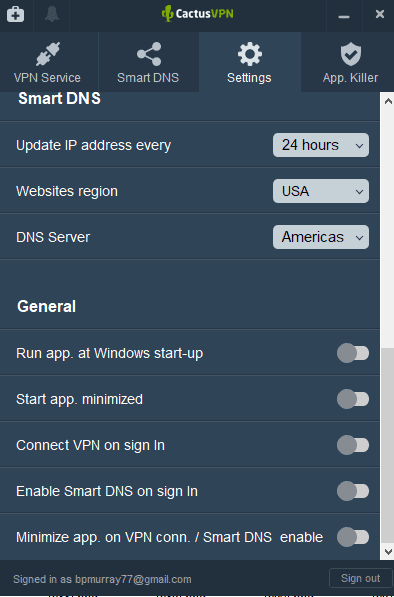
Moving on to the more unique features, the desktop client has an app killer. This lets you define a list of programs that CactusVPN will automatically close if the VPN connection drops.
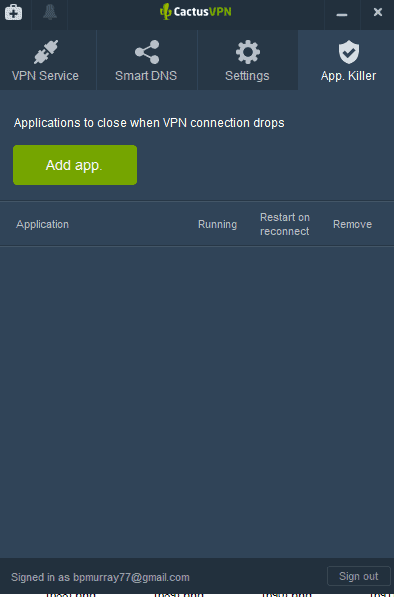
The other interesting feature is “smart DNS,” which is CactusVPN’s way of getting users access to geoblocked content. CactusVPN claims on its website that SmartDNS can get you access to over 320 unblocked websites, and during our testing we found this to be generally true.
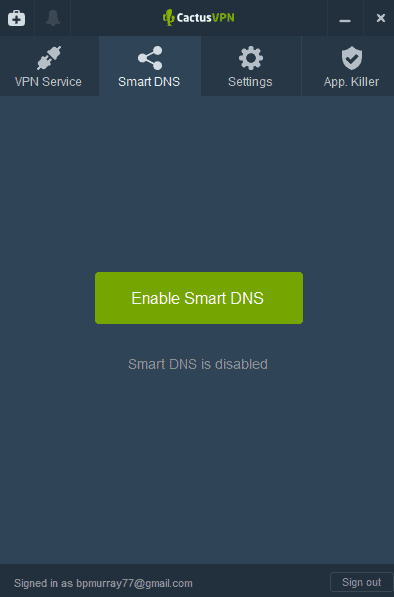
There were some issues with the “smartDNS” feature, though, which we’ll look at in more detail shortly in the “ease of use” section. The most glaring things that CactusVPN failed to include is some kind of split tunneling. (For services that include this feature, be sure to check out our CyberGhost review and Surfshark review.)
Split tunneling is an increasingly common feature that allows you to choose on an app-by-app basis which programs use the VPN’s protected tunnel connection and which ones use an unprotected connection. You can see two excellent but distinct implementations of this feature in our ExpressVPN vs CyberGhost article.
CactusVPN Features Overview
| Payment methods | PayPal, Credit card |
| Accepts cryptocurrency | |
| Simultaneous connections | Unlimited |
| Supports split tunneling | |
| Unlimited bandwidth | |
| Free trial available | |
| Refund period | |
| Worldwide server amount | 37 servers in 22 countries |
| Desktop OSes | Windows, MacOS, Android TV, Fire TV |
| Mobile OSes | Android, iOS |
| Browser extensions | Chrome, Firefox |
| Can be installed on routers | |
| Can access Netflix US | |
| Can access BBC iPlayer | |
| Can access Hulu | |
| Can access Amazon Prime Video | |
| Encryption types | 256-AES |
| VPN protocols available | IPSec, OpenVPN, PPTP, L2TP, SSTP, IKEv2, Wireguard®, SoftEther |
| Enabled at device startup | |
| Allows torrenting | |
| No-logging policy | |
| Passed DNS leak test | |
| Killswitch available | |
| Malware/ad blocker included | |
| Live Chat | 24/7 |
| Email support | 24/7 |
| Phone support | |
| User forum | |
| Knowledgebase |
Pricing
When you first visit the CactusVPN website and click on the “get CactusVPN” button, you’re taken to a page that shows one plan option in four time frames, but this is actually only a small fraction of what CactusVPN offers for pricing plans.
If you scroll down a little, you’ll see the text “pick from our smaller plans,” which you can click on to be taken to all the plan options. Here, there are five different VPN plans laid out, each with four time periods ranging from monthly to two years.
- Unlimited GB
- 5
- Yes
- Unlimited GB
- 5
- Yes
The first two plans are the U.S. and UK plans. The U.S. plan gives users access to the seven servers that CactusVPN has in the U.S., while the UK plan allows users to access only the four servers found in the UK. These plans do not allow for P2P and do not include the Smart DNS, meaning they cannot be used for streaming.

The next plan is called the “Liberty” plan and gives users access to nine servers found in Spain, the Netherlands, Germany, Latvia, Switzerland and Romania. Unlike the UK and U.S. plans, this plan allows for P2P, but it does not give users access to the Smart DNS.
While every plan so far has excluded the use of the “smart DNS” feature, the next plan is a Smart DNS–only plan. This plan does not allow for use of the VPN at all, but gives unlimited access to the Smart DNS. The U.S.-only plan, UK plan, Liberty plan and the Smart DNS-only plan all cost the same amount, no matter which time frame you sign up for.
For these smaller plans, the pricing is pretty competitive in almost every time frame. Coming in at under $7 a month if you choose to pay monthly, this is almost as good as what we saw in our Mullvad review, which is one of the best monthly subscription deals out there.
The longer subscription periods offer increasing savings, with the three-month plan coming in at $5.99 a month, the annual plan bringing this down to only $3.25 a month and the two-year plan bringing the price all the way down to $2.79 per month. This costs even less than the excellent long-term pricing we saw in our NordVPN review.
The final plan that CactusVPN offers is the VPN + Smart DNS plan, which gives users access to all 37 servers, allows for P2P and includes use of the Smart DNS. This plan comes in at $9.99 a month and the two-year option breaks it down to only $3.95 a month.
Free Trial
In addition to the relatively affordable price, there is also a CactusVPN free trial that lets you test the service out for three days. While it isn’t the most generous free plan we’ve seen, and is far from landing itself on our list of best free VPN services, it’s still a good way to test the VPN out for yourself and see if it suits your needs. It’s also an improvement on the 24-hour free trial that CactusVPN used to offer.
On top of the trial, CactusVPN also has a 30-day money-back guarantee so you can still get a refund if you aren’t satisfied after using the VPN for a bit.
Ease of Use
At first glance, the CactusVPN website and apps are both clean looking and easy to use. The website is easy to navigate and all of the CactusVPN download links are easy to find. Plus, the desktop client is well organized and puts all the features and settings into four tabs at the top of the page.
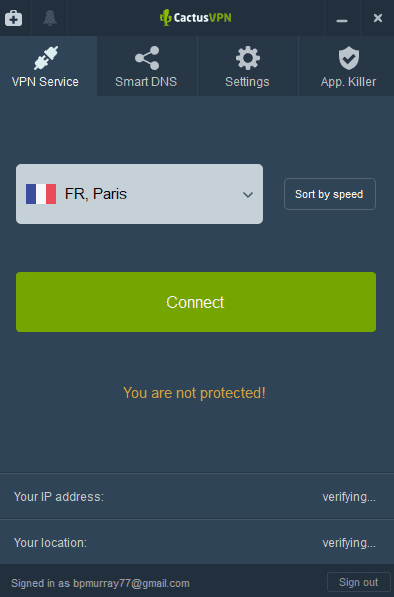
However, we encountered a number of issues with CactusVPN’s software. For starters, while the software and settings are well laid out and easy to navigate, the server list is pretty bad. The servers don’t seem to be organized alphabetically by country or city, and there is no search bar, although the number of servers to browse through is pretty limited.
There is the option to sort the servers by speed, but we found this to be inconsistent — often the servers at the top of this list would not actually be the fastest.
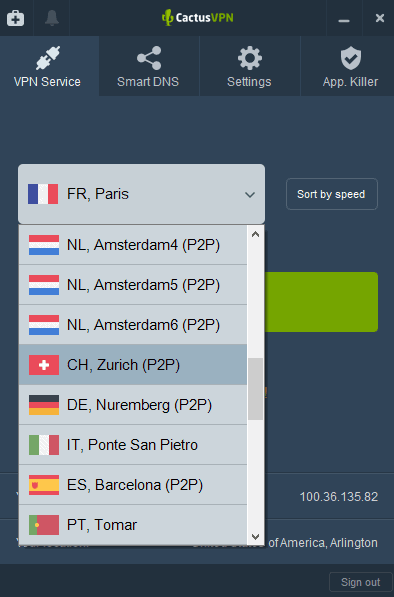
Troubles With DNS
Much more of an issue than the server list, though, were the DNS settings. When we tried to use the DNS leak protection setting, we started having issues. You’re given three options when turning the feature on, which is turned off by default for some reason. These options are whether to use the CactusVPN DNS, OpenDNS or the Google public DNS.
When we tried the CactusVPN DNS option, we found that most websites would not load at all. We also tried OpenDNS, which worked much better but would still have trouble loading certain sites from time to time, seemingly at random.
The Smart DNS service was just as bad. While it worked at first and we were able to get access to streaming sites using it, before long the internet connection on our computer stopped working entirely. We disconnected the Smart DNS with no results, and then right-clicked the CactusVPN icon in the system tray and selected exit, still with no results.
At this point, we checked the task manager and found that CactusVPN appeared to still be running despite the fact that it no longer appeared in the system tray, and our internet connection was still not working. We ended the “CactusVPN GUI” program from the task manager and the internet still would not work.
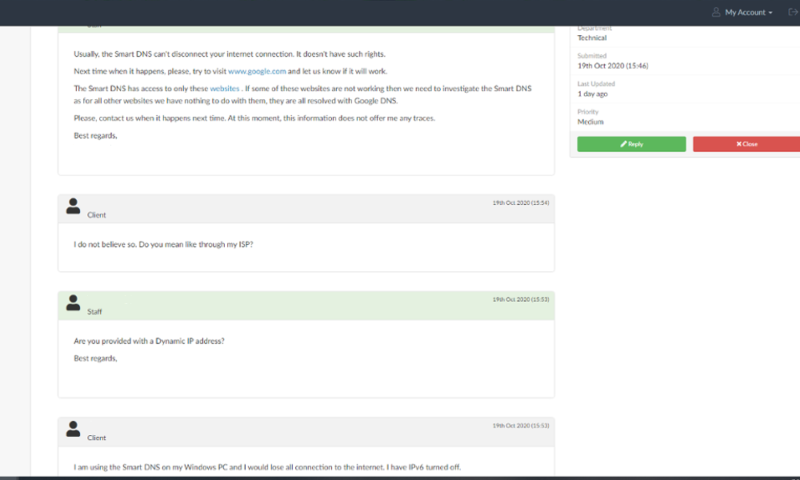
The only thing that eventually got our internet back was restarting the computer. We contacted support about these issues, but weren’t able to find a solution. Ultimately, we can’t be entirely sure whether these issues had something to do with the connection on our end or more to do with CactusVPN’s service, but using the “smart DNS” feature caused us to have connection issues.
We recommend checking out our Private Internet Access review to see a VPN that uses a compact user interface similar to CactusVPN’s, but without all the headache and with much more versatility.
Speed
On the first of our speed tests, which was relatively close by here in the U.S., we saw impressive speeds with a very low ping time that would potentially make CactusVPN a great VPN for gaming. Everything felt very responsive and there was no trouble streaming HD video. However, things went downhill quickly from there.
| Location | Ping ms | Download Mbps | Upload Mbps |
|---|---|---|---|
| Unprotected | 4 | 292.87 | 342.69 |
| U.S. | 8 | 226.25 | 166.37 |
| UK | 82 | 32.11 | 17.20 |
| Brazil | 132 | 33.98 | 18.00 |
| Japan | 265 | 4.51 | 77.88 |
| France | 86 | 37.21 | 144.33 |
| Average | 115 | 66.81 | 84.76 |
The UK, France and Brazil all had comparable speed test results with a majority of our unprotected download speeds being lost. These servers all felt about the same with websites and content loading in noticeably slower, but only by a second or two.
Japan was the worst server in terms of both download speed and ping, but was still surprisingly usable despite the numbers we saw on paper. Websites still loaded in sluggishly, but videos could play in 1080p without any issue once they loaded.
If you’re looking for the fastest VPN, we suggest you check out our ExpressVPN review. ExpressVPN has reliably high speeds almost anywhere in the world and offers excellent performance for P2P downloads and streaming.
Security
The two main aspects that build the foundation of any secure VPN are the protocol and encryption that it uses. CactusVPN does a good job with VPN protocols, as it offers five options, namely OpenVPN, L2TP/IPSec, IKEv2, SSTP and PPTP. You can learn more about all of these protocols in our VPN protocol breakdown, but in short, OpenVPN is the best choice of the five.
For encryption, CactusVPN does not offer any options, but instead, locks you into AES-256. You can read more about encryption in our encryption article, but AES-256 is a very strong encryption, and when it’s paired with OpenVPN, it’s widely considered the gold standard VPN setup.
With all that said, we did detect DNS leaks during our testing when the DNS leak protection setting was turned off, which it was by default. This means that we were still exposing some of our information if the DNS protection option was off while using the VPN.
As we already mentioned, turning the DNS protection on caused a variety of issues and headaches with the software, but it did seem to work in preventing the DNS leaks we saw. We suggest taking a look at our TorGuard review if you’re looking for a VPN provider that offers reliable online privacy and security without DNS leaks.
Privacy
CactusVPN has a respectably concise and straightforward privacy policy. It states on its website that it doesn’t keep logs, but what that really means is often vague. Taking a closer look, the privacy policy states that CactusVPN does not collect any information about the use of its VPN service, but there is still some information it collects and even shares.
There is some information it has to collect in order to get payment and maintain your account, such as your name, address and payment information.
Some information is also gathered from cookies on the website, although this is practically inescapable these days on any site. These cookies are largely used to maintain the site. It does collect your IP address when you visit the website, but this is never associated with your account.
The most concerning thing is that it says CactusVPN will respond to subpoenas and will collect information when it is “necessary to protect” its rights in court, but this is a bit vague and does not specify what information it will collect in this situation.
Streaming Performance
Whether we had the DNS protection setting turned on or off, we could not get access to any streaming sites through the VPN. Netflix, Hulu, Amazon Prime Video and BBC iPlayer all blocked us while using the VPN.
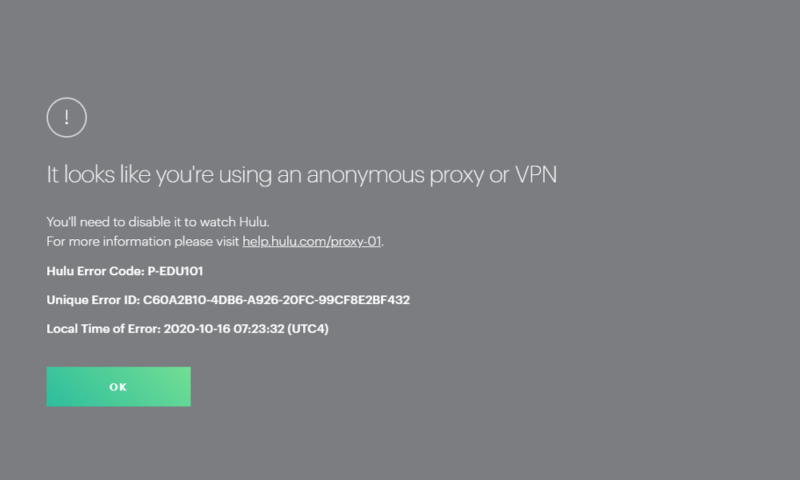
However, that’s what the “smart DNS” feature is for, and from our time using it, the “smart DNS” seemed to work as advertised — as long as it was actually working. While using the “smart DNS,” we were able to get content from BBC iPlayer and all the other streaming sites we mentioned.
Most VPNs don’t use anything like “smart DNS” and simply access streaming content themselves without an additional tool. If you’re interested in a more reliable and simple way to get around geoblocking, be sure to check out our best VPNs for Netflix and Hulu lists.
Server Locations
CactusVPN offers 37 servers in 22 countries, which is far from impressive. If you compare that to the likes of NordVPN, which has thousands of VPN servers, or our HideMyAss review where we noted that the HMA server network covers over 190 countries, CactusVPN’s network is very limited.
That said, it does cover the most heavily trafficked areas, such as the U.S. and United Kingdom, and also provides coverage to parts of Asia and South America.
Customer Service
The customer service with CactusVPN is a bit hit or miss. The knowledgebase is fairly expansive and covers all the setup and general questions that most people will have. However, there is no live chat available on the website, meaning the only way to get in contact with a person is to submit a ticket.

That said, the customer support team was pretty quick to reply, typically getting back to us within 15 minutes. Your answer isn’t sent to your email inbox, though, and you can only view support’s response from within your account on the CactusVPN website.
The Verdict
In many ways, CactusVPN seems to still be ironing out the issues with its service. There are some things that it does in a unique way, especially with the “smart DNS” feature, that may have merit to them.
However, at this stage the service fails to deliver on its promises, and the “smart DNS” gave us all kinds of issues rather than making it easier to watch streaming content. While there is potential here, there are currently just too many issues for us to recommend CactusVPN.
Have you used CactusVPN before? How did your experience compare to ours? Did you make sure to turn on the DNS protection option before using it? Let us know in the comments below and, as always, thanks for reading.
FAQ
CactusVPN is a virtual private network provider that can help protect your identity and information online by encrypting it and sending it through a private tunnel before it reaches its final destination.
CactusVPN relies on the OpenVPN protocol and AES-256 encryption, meaning it is generally safe. However, during our testing we found that the default settings would cause DNS leaks, leaving some of our information visible even while using the VPN.
CactusVPN offers a three-day free trial to anyone who’s interested. After that, you have to pay to continue using the service.


